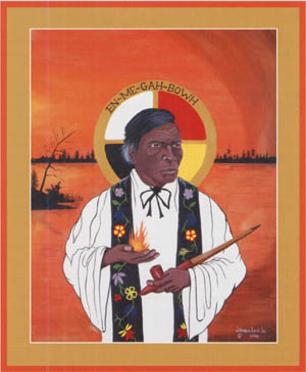| An icon of the Nativity of John the Baptizer |
When you hear the name “John the Baptizer” or “John the
Baptist” what comes to mind?
-Someone in the desert dressed in camel’s hair?
-A wild man who ate locusts and wild honey?
-A cousin of Jesus?
-An aesthetic who lived in the wilderness?
-An angry man who called stuffy religious folks, “A brood of
vipers!”?
-One who was unjustly executed?
-The forerunner of the Lord?
-The Prophet of the Most High?
-The baptizer of Jesus?
-Someone who proclaimed the Good News of repentance and
forgiveness of sins?
-How about all of the above?
John the Baptist captivates our theological imagination in
ways that few others can. Perpetually we are gifted by this rich character whom
we specifically remember during Advent and Epiphany. In Advent we remember John’s
prophet-ability as we await Christ’s coming and during Epiphany we celebrate
Jesus’ Baptism by John. But, today on the transferred Feast of the Nativity of
John the Baptist we are not there yet.
As we dwell in this moment from Holy Scripture when John’s
elderly parents celebrated the miracle of this child’s birth, all that we know
of this great character is potential. Now, I am no physicist. And, I do not
profess to possess a wealth of knowledge about energy, but I do remember
learning about potential energy in middle school.
One way of defining this term is “The energy possessed by a
body by virtue of its position relative to others, stresses within itself,
electric charge, and other factors.”[1] A
body possesses within itself a certain amount of could be energy based on where
it is, how it relates to surrounding bodies, and other factors both internal
and external. This physics definition appears even more intriguing when we
connect it to how we relate to the universe theologically or spiritually.
All of us have potential within us. Just like how Zechariah—once
his tongue was loosed—spoke of John’s trajectory, we too have a potential path
that is laid out for us by our God. God has placed in us energy, life, a divine
spark so to speak, through which we eternally connect with our Father in
heaven. This is beautiful and wonderful and reassuring to know that like John
we have the potential in us to be heralds of the Most High. But, how does this
potential become actualized? How does the spiritual energy in us explode from
perspective to reality?
All of the wild things that stand out about John would have
been completely for naught had it not been for one thing, one catalyst. John
knew, his family knew, perhaps the whole countryside of Israel knew John was
not acting on his own. He was in the service of God. Put another way, the
potential energy in John was actualized by coming in contact with Christ. Sure
he would have been an interesting character on his own, but he blasted onto the
scene as one who prepared the way. John got people ready to receive the Good
News that Jesus had come. John enabled people to repent, so that they could
know fully the Most High God was incarnate and was present.
What potential energy lies within you? What is the ministry
into which you are called? What is it that God has in store for you? There are
a multitude of ways to serve God, here in this church and beyond. Whether it is
through preparing for worship, studying God’s word together, reaching out to
the community of Decatur, or reaching in to serve other parishioners, there are
many ways to actualize the potential spiritual energy within you. Take some
time this summer to listen to what God is calling you to do.
Once you see that trajectory allow Christ to inspire you. As
you see what God is calling you to do allow the Good News of repentance and the
forgiveness of sins to free you. Trust that the spark of Jesus’ love will energize
you and ignite in you a ministry like that of John the Baptist.
May all of us trust the potential that God has planted within
us. May we be inspired by the Good News of Christ Jesus through repentance and
forgiveness of sins. And, may we be energized by the Spirit of God and go light
up the world with it.
[1]https://www.google.com/search?safe=active&q=Dictionary#dobs=potential%20energy



